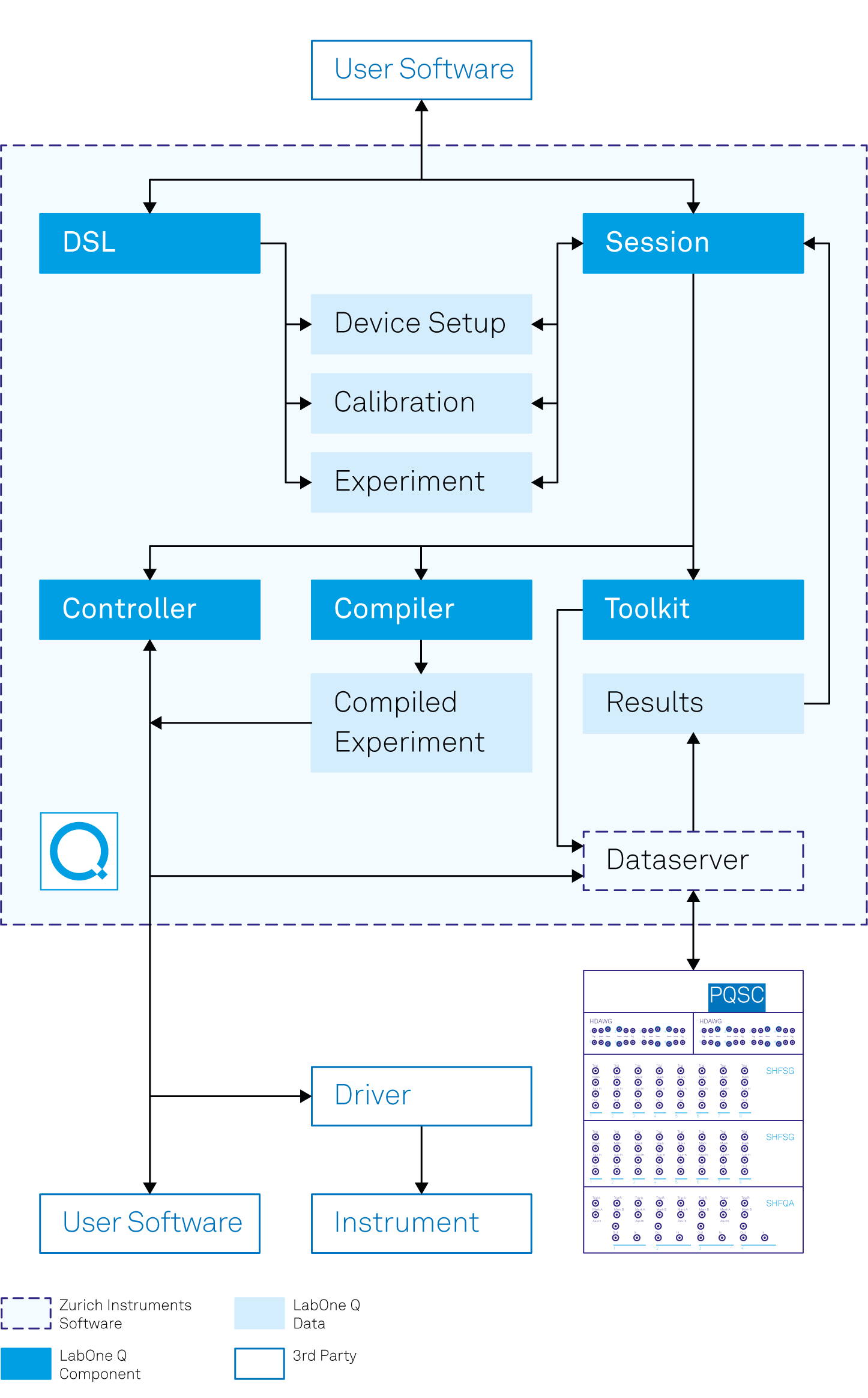Zurich Instruments LabOne Q software framework for quantum computing control
Project description
LabOne Q
LabOne Q is Zurich Instruments’ software framework to accelerate progress in quantum computing. Its Python-based, high-level programming interface enables users to concentrate on intuitive, efficient experiment design, while automatically accounting for their instrumentation details and maximizing useful computation time. Tight system integration between software and hardware ensures a seamless user experience from setups with a single qubit to those with 100 and more.
Requirements
⚠️ This software requires Python 3.10 or higher. We assume that
pipandpythonuse a corresponding Python version.
💡 To ease the maintenance of multiple installations, we recommended to use Python environments through e.g. venv, pipenv or conda.
Installation
The following command will fetch the latest (quarterly) stable release of LabOne Q from PyPI and make it available in your current environment.
$ pip install --upgrade laboneq
Preview releases are typically published every two weeks and contain new features, improvements, or bugfixes. They undergo the similar internal testing, but do not receive backports of bugfixes. Preview releases can be installed through:
$ pip install --upgrade --pre laboneq
If you instead would like to install from source, you will additionally need to install a Rust toolchain. For this, follow the instructions on rustup.rs.
Documentation
Find the LabOne Q Manual here: https://docs.zhinst.com/labone_q_user_manual/
Dive right into using LabOne Q and generate your first pulse sequence: https://docs.zhinst.com/labone_q_user_manual/getting_started/index.html
The API Documentation is published here: https://docs.zhinst.com/labone_q_user_manual/core/reference/simple.html
Architecture
Project details
Release history Release notifications | RSS feed
Download files
Download the file for your platform. If you're not sure which to choose, learn more about installing packages.
Source Distributions
Built Distributions
Filter files by name, interpreter, ABI, and platform.
If you're not sure about the file name format, learn more about wheel file names.
Copy a direct link to the current filters
File details
Details for the file laboneq-26.1.0-cp310-abi3-win_amd64.whl.
File metadata
- Download URL: laboneq-26.1.0-cp310-abi3-win_amd64.whl
- Upload date:
- Size: 3.1 MB
- Tags: CPython 3.10+, Windows x86-64
- Uploaded using Trusted Publishing? No
- Uploaded via: uv/0.9.25 {"installer":{"name":"uv","version":"0.9.25","subcommand":["publish"]},"python":null,"implementation":{"name":null,"version":null},"distro":{"name":"Debian GNU/Linux","version":"13","id":"trixie","libc":null},"system":{"name":null,"release":null},"cpu":null,"openssl_version":null,"setuptools_version":null,"rustc_version":null,"ci":true}
File hashes
| Algorithm | Hash digest | |
|---|---|---|
| SHA256 |
d43bdf6ec4bdba7241dbd665659b6ff6790e9c316d965845df291111117f37ac
|
|
| MD5 |
daadd1c1ec688815ea4a09450097fbdd
|
|
| BLAKE2b-256 |
c0d106fc6ee2d7f599e0e2ebfac9b90f67d6386a96323a1dd04d789a2593ab07
|
File details
Details for the file laboneq-26.1.0-cp310-abi3-manylinux_2_17_x86_64.manylinux2014_x86_64.whl.
File metadata
- Download URL: laboneq-26.1.0-cp310-abi3-manylinux_2_17_x86_64.manylinux2014_x86_64.whl
- Upload date:
- Size: 3.2 MB
- Tags: CPython 3.10+, manylinux: glibc 2.17+ x86-64
- Uploaded using Trusted Publishing? No
- Uploaded via: uv/0.9.25 {"installer":{"name":"uv","version":"0.9.25","subcommand":["publish"]},"python":null,"implementation":{"name":null,"version":null},"distro":{"name":"Debian GNU/Linux","version":"13","id":"trixie","libc":null},"system":{"name":null,"release":null},"cpu":null,"openssl_version":null,"setuptools_version":null,"rustc_version":null,"ci":true}
File hashes
| Algorithm | Hash digest | |
|---|---|---|
| SHA256 |
7c5ce645b9cc6055acc82c16e06e1ba8de46f616826b1f987752642447e8b61c
|
|
| MD5 |
7a55def16add57936dd62f00523be73e
|
|
| BLAKE2b-256 |
5ff93d7d456ac53baaa2eb947335801a21520bb0b172d6fc391ca07d35e0b659
|
File details
Details for the file laboneq-26.1.0-cp310-abi3-manylinux_2_17_aarch64.manylinux2014_aarch64.whl.
File metadata
- Download URL: laboneq-26.1.0-cp310-abi3-manylinux_2_17_aarch64.manylinux2014_aarch64.whl
- Upload date:
- Size: 3.0 MB
- Tags: CPython 3.10+, manylinux: glibc 2.17+ ARM64
- Uploaded using Trusted Publishing? No
- Uploaded via: uv/0.9.25 {"installer":{"name":"uv","version":"0.9.25","subcommand":["publish"]},"python":null,"implementation":{"name":null,"version":null},"distro":{"name":"Debian GNU/Linux","version":"13","id":"trixie","libc":null},"system":{"name":null,"release":null},"cpu":null,"openssl_version":null,"setuptools_version":null,"rustc_version":null,"ci":true}
File hashes
| Algorithm | Hash digest | |
|---|---|---|
| SHA256 |
4739f4cea336c0ad26e8dc7305ea547bcbd192a84bd6e17d4bf5a5bbe7a40fcb
|
|
| MD5 |
748995fe128b15d227002833677cac29
|
|
| BLAKE2b-256 |
a90f5836724b67ab53f20873ccf85e74e7336f4630d597af2d416fe1e1f941a3
|
File details
Details for the file laboneq-26.1.0-cp310-abi3-macosx_10_12_x86_64.macosx_11_0_arm64.macosx_10_12_universal2.whl.
File metadata
- Download URL: laboneq-26.1.0-cp310-abi3-macosx_10_12_x86_64.macosx_11_0_arm64.macosx_10_12_universal2.whl
- Upload date:
- Size: 5.3 MB
- Tags: CPython 3.10+, macOS 10.12+ universal2 (ARM64, x86-64), macOS 10.12+ x86-64, macOS 11.0+ ARM64
- Uploaded using Trusted Publishing? No
- Uploaded via: uv/0.9.25 {"installer":{"name":"uv","version":"0.9.25","subcommand":["publish"]},"python":null,"implementation":{"name":null,"version":null},"distro":{"name":"Debian GNU/Linux","version":"13","id":"trixie","libc":null},"system":{"name":null,"release":null},"cpu":null,"openssl_version":null,"setuptools_version":null,"rustc_version":null,"ci":true}
File hashes
| Algorithm | Hash digest | |
|---|---|---|
| SHA256 |
188ab47699bbc2fbcaa44a5b8457f17716e459543ffadef0556f5cd38a87f58b
|
|
| MD5 |
e034d4eb53be2cb8540ca9d654dcffc3
|
|
| BLAKE2b-256 |
8c2076d798e9661845a77934db4fddd55d7a6caffdf6aabddda40c1b517fc45f
|














